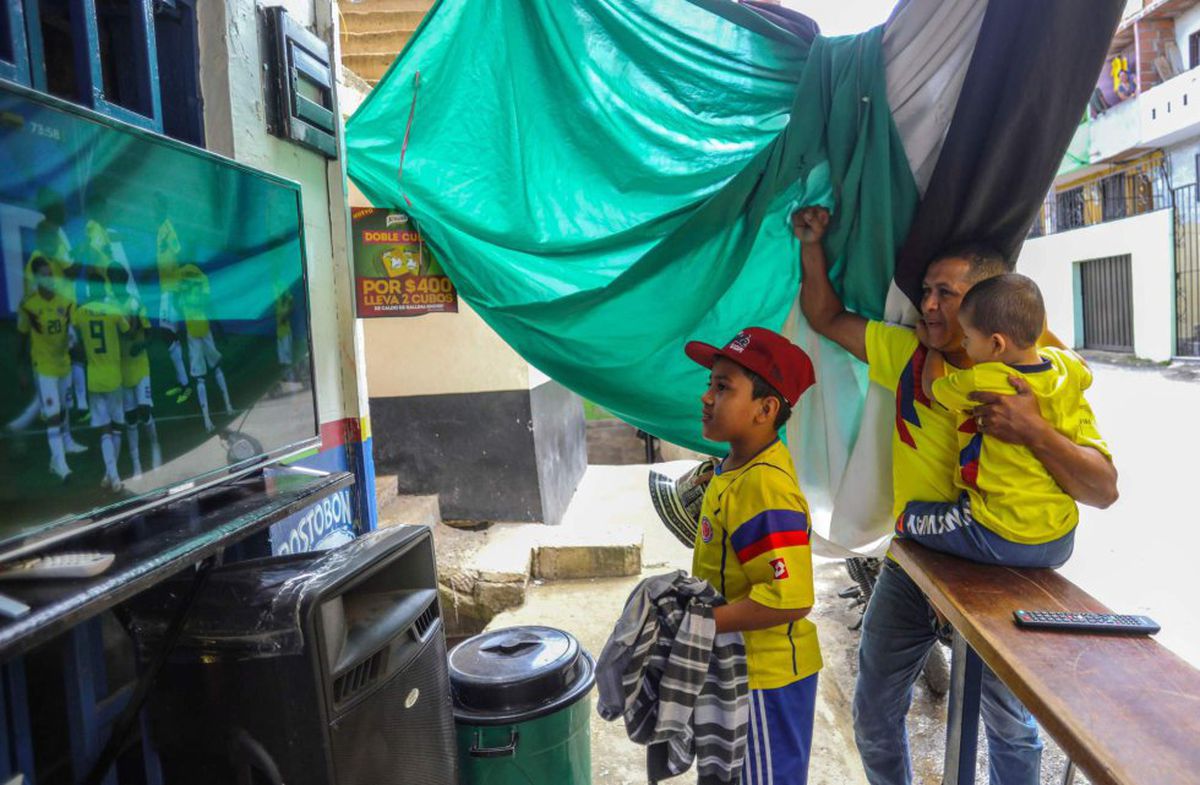A family watches a Colombian national team match on television, in Medellín, on June 28, 2018. JOAQUIN SARMIENTO (AFP)
The economist Juan Pablo Posada says that he came to the gambling sector in Colombia through his academic research on the world of crime.
He does not oppose or demonize the existence of these businesses, he reiterates, but he knows their chiaroscuro closely and that is why he continues his galloping evolution as one of the dynamos of the economy in recent years: making a weighted analysis of 2021 and 2022, according to DANE , games of luck and chance have generated around 1.7 out of every 100 pesos of the Gross Domestic Product, more than the manufacture of textiles, clothing and footwear combined.
In addition, it is the economic sector that grew the most.
Last year's results indicate that the roulette business continues to turn a profit.
This is a finding supported by data from the state-owned Coljuegos, an entity attached to the Ministry of Finance that manages the monopoly of gambling and which last year had a turnover of 796,536 billion pesos, 18% more than the previous year. (613,000 million).
Juan Daniel Oviedo, ex-director of DANE and today a candidate for mayor of Bogotá, reels off the results.
He explains that, due to the labels used by the entity, based on the United Nations generic accounting system, the sector is embedded under the misleading chapter of "Artistic and entertainment activities", which grew by 42.2% between the fourth quarter of 2021 and the same period of 2022,
The economist draws attention: "At first glance, people may think that concerts, movies and sports events or the orange economy are marking growth."
Nothing more imprecise, he adds.
The two activities that weigh the most within this chapter are "games of luck and chance, followed by a segment called 'other personal activities', where the added value generated, for example, by domestic service is measured."
Namely: 80% of the contributions of artistic and entertainment activities, which added 1.2 percentage points to the country's GDP in 2022, came from betting and salary remuneration for employees in Colombian homes.
In the other 20% are, there yes, the expenses in shows including the cinema.
To get a more complete idea of the previous photo, it would suffice to mention that the growth rate of games of chance, always according to official data, has a weight similar to that contributed in the last two years by livestock and is slightly higher than refining. of oils and mixture of fuels.
Specifically, the two sections that reaped the most revenue in 2022 were casinos and bingos (319,710 million), encouraged by the reopening, followed by Internet games and bets (255,376 million).
A matter, moreover, associated with the change in habits spurred by the confinements, which led to half the world in a boom in online betting.
Oviedo recalls that one of the effects of the health crisis was that “we went out to consume like crazy.
Household consumption grew 2.5 times faster than it had been growing before the pandemic and Internet gambling expenses skyrocketed.
Today we are talking about a contribution of 21 trillion pesos, out of the 1,464 trillion that adds up to the total GDP”.
For various economists consulted, it is an area full of dichotomies, risks and benefits.
More than one analyst draws parallels with the consumption of alcohol or junk food: they generate money in taxes for health or education, but they entail serious problems if they become a vice or addiction.
Figures from Coljuegos indicate that since 2018 gambling activities have transferred some 2.3 trillion pesos in taxes, mostly for the health sector (only in 2022 there were 411,528 million).
But serious doubts have also been raised about the ability to generate "long-term production", despite the fact that economists acknowledge that it can function as a good conjunctural support: "the externality that these resources compensate when it comes to finance health and education programs”, recalls Oviedo.
From Coljuegos they indicate, in the same line, that the sector promotes some 150 thousand direct jobs.
But the experts are hesitant again, especially around the long-term benefits.
The central question is: at what price?
These are very focused activities, maintains a source from the sector, whose value actually "remains in the service provided, they do not generate externalities due to their virtual nature."
Neither are physical casinos, he assures, because they are not markets, in general, that promote the development of more activities in the same place: they do not produce commerce or production of clothing or food, nor do they lead to the creation of offices, for example.
Juan Pablo Posada, an economist at the EAFIT University in Medellín, returns to the negative social impact generated by compulsive gambling.
"Unlike junk food, or sugary drinks," he argues, "where taxes and labels are supported, betting its social costs are still low."
Reason enough for Juan Daniel Oviedo to consult academic psychiatry articles published during the pandemic when he saw that betting behavior was advancing in the DANE indicators.
“The results of the investigations,” explains Oviedo, “show that during the pandemic, online betting and gaming around the world took a load off many people who are embarrassed by the social stigma attached to casinos.
They no longer ran the risk of meeting their partner or an acquaintance.
In addition, they could enter and bet in houses around the world from their cell phone.
In the Colombian case, the only recent study on compulsive gambling, prepared by the National University, revealed in 2020 that, after surveying 5,858 students, more than 19% would have serious gambling addiction problems.
The work also pointed out that low-income people were at greater "risk of generating an excessive attachment to gambling."
From Coljuegos they assure that there has been an effort to coordinate entities of the "public sector, international regulators, unions and suppliers" to improve regulation, in which Colombia is a pioneer in the digital field, and "greater efficiency in the resources generated".
The economist Posada explains that during the crisis caused by the pandemic another social factor was added: “The Government of Iván Duque delivered the subsidies called Solidarity Income to the poorest people.
This represented an unprecedented level of access to banking that translated into greater access to financial services and credit cards.
The digital bookmakers found thousands of potential customers there who helped the expansion of virtual bets
In colombia".
The Colombian population, repeat the sources consulted, has shown a historical attachment to other forms of gambling, such as lotteries and traditional chances.
These are million-dollar markets that, despite the enormous efforts to regulate them, embody various risks accentuated by the digital sphere.
In Colombia, as in other parts of the world, there are many indications of links between illegality, money laundering, match-fixing and criminal organizations with the world of betting.
It is precisely one of the fronts on which Coljuegos has worked the most: "We have blocked more than 2,700 web pages that do not have authorization to operate in Colombia, in addition to seizing and destroying machines that do not have contracts throughout the territory."
A stock market analyst who preferred to keep his name confidential indicates, in any case, that it is still a "puzzle that still lacks chips to understand his great behavior."
It is a source of resources that still resists vigorously despite the economic uncertainty and the decrease in consumption.
That is why economists do not exactly look kindly on this kind of gold mine.
The analyst concludes: "But I say it from the point of view of the financial sector: today nobody likes to participate in that type of investment."
Subscribe here
to the EL PAÍS newsletter on Colombia and receive all the latest information on the country.






